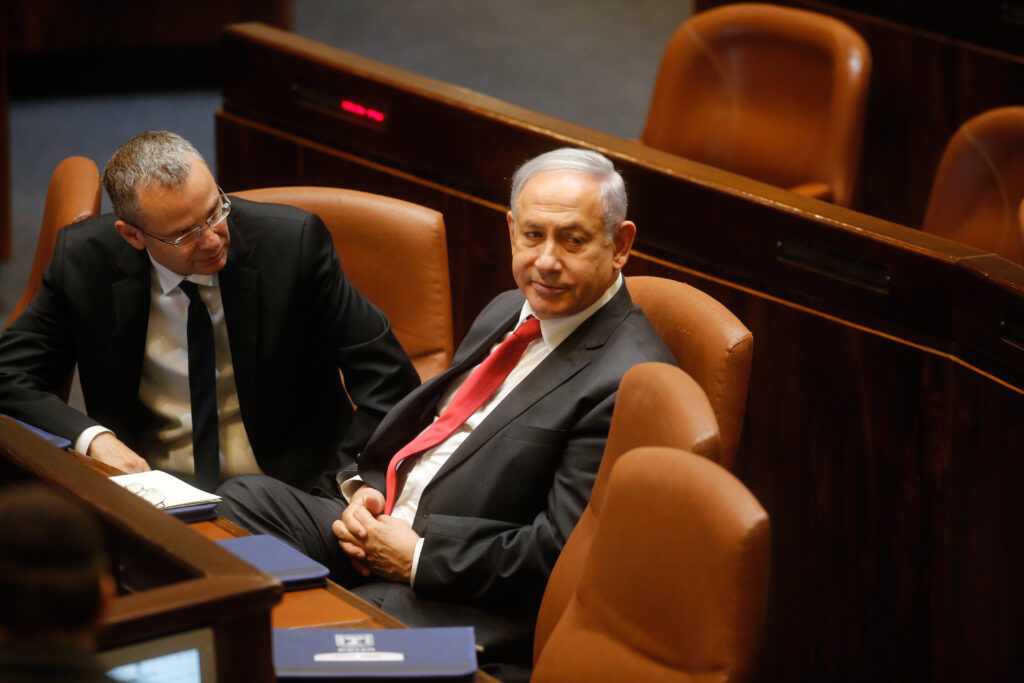Australia/Israel Review
Israel’s judicial reform battle flares again
Feb 25, 2025 | Ilan Evyatar

While the attention of most Israelis remains fixed on the Gaza ceasefire and the fate of the hostages, another battle has once again been heating up – the long-running judicial reform controversy which wracked the country throughout 2023 up until October 7.
In a dramatic and unprecedented move, Prime Minister Binyamin Netanyahu, Justice Minister Yariv Levin and Knesset Speaker Amir Ohana all boycotted the swearing-in ceremony of the new Supreme Court President, Isaac Amit, on Feb. 13.

Israel’s new Supreme Court President, Justice Isaac Amit
The absence of Israel’s top political leaders at Amit’s inauguration underscores the profound and ongoing tension between the executive and judicial branches. Speaking at the swearing-in ceremony, Israeli President Isaac Herzog strongly condemned the boycott, stating that in a democracy, one branch of government should not boycott another, and that the legal system should not be turned into a political battlefield. Meanwhile, Amit, in his inaugural speech, reiterated his commitment to judicial independence, noting that the judiciary does not stand above the other branches but works alongside them, “as an equal partner in the democratic framework of checks and balances.”
Amit called on Levin to maintain the regular working meetings that have always taken place between the Justice Minister and the Supreme Court President “to ensure that the country’s citizens and residents continue to receive a high-quality and efficient judicial system.”
However, Levin, the architect of the controversial judicial reform plan launched in January 2023, declared that he does not recognise Amit’s appointment. “The procedures by which he was ‘elected’ are fundamentally flawed and illegal,” he asserted.
Two right-wing NGOs, Lavi and Im Tirtzu, had petitioned the High Court of Justice against Amit’s appointment, alleging that claims of conflicts of interest were not thoroughly examined. They pointed to cases Amit had presided over where, they argued, he should have recused himself due to professional or personal ties. The High Court of Justice dismissed the petition, with Justice Alex Stein ruling that the Judicial Selection Committee – which chooses judges, and selected Amit – was the appropriate body to evaluate such concerns and that it had reviewed all relevant information before confirming his appointment.
The Government’s boycott is the latest chapter in a long-running battle over judicial authority. Earlier this year, Levin and new Foreign Minister (and former Justice Minister) Gideon Sa’ar introduced a compromise proposal aimed at reforming the Judicial Selection Committee. Their plan sought to replace the two Israel Bar Association representatives who currently are part of the nine-member committee with one government-appointed attorney and one opposition-appointed attorney, while also shifting to only requiring a simple ma jority rather than the current supermajority for Supreme Court appointments.
Before the Hamas attack on October 7, judicial reform protests had reached a fever pitch, with hundreds of thousands of Israelis demonstrating weekly against the Government’s proposed changes. The protests both underscored and exacerbated deep divisions within Israeli society, with some military reservists threatening to refuse service and prominent business leaders warning of significant economic fallout if the proposed reforms went ahead. The crisis created the perception of a fractured and weakened Israel – a factor that Hamas leaders reportedly considered when planning their attack on October 7.
According to intelligence assessments, Hamas leader Yahya Sinwar miscalculated Israel’s resilience, believing that the internal discord over judicial reform would paralyse the country’s response as political divisions would prevent Israel from committing to a prolonged ground war in Gaza. However, the attack had the opposite effect, uniting Israelis across the political spectrum and temporarily sidelining the judicial reform debate, as national security and fighting a war, in Gaza but also against Iranian proxies in Lebanon, Iraq, Yemen and the West Bank, took precedence.
Yet ongoing tensions and stalemate over the Judicial Selection Committee led to an unprecedented situation where, for over a year and four months, Israel’s Supreme Court functioned without a permanent President. In addition, the Court is currently operating with 12 judges instead of its full array of 15 justices. Levin refused to convene the Committee for more than a year – apparently to prevent its expected selection of Amit – until ordered to do so by the Court itself this January.
Critics argue that the prolonged leadership vacuum was a deliberate tactic by the Government to pressure the judiciary into accepting its reforms.
Levin’s refusal to recognise Amit’s appointment could have significant ramifications for the judiciary. As justice minister, Levin shares authority with the Supreme Court president over the administration of the judicial system. Many key decisions – ranging from budgetary allocations to judicial appointment – require their joint approval.
Critics argue that Israel’s Judicial Selection Committee currently grants sitting justices and their legal allies excessive influence over new appointments, effectively allowing them to choose their own successors. The current committee consists of nine members: three Supreme Court justices, two government ministers, two Knesset members and two representatives from the Israel Bar Association. While Levin’s reform proposals in 2023 would have assured the government a majority on the committee, the more recent Levin-Sa’ar proposal, replacing the Bar Association representatives with attorneys appointed by the government and the opposition, would give the government four votes, the opposition two, and members of the existing Court three. Supporters claimed this would enhance judicial diversity and prevent ideological gatekeeping by the existing judicial establishment, while opponents warn it could politicise the courts by making judicial selection contingent on political loyalty rather than legal expertise.
Former Attorney-General Avichai Mandelblit was among those who sounded the alarm, warning that these reforms could undermine judicial independence. “This is not a gradual reform – it is a fundamental shift that would change the DNA of the Supreme Court,” he cautioned.
However, supporters of the proposal argue that concerns over judicial independence are overstated, pointing to Mandelblit himself as an example. When he was appointed attorney-general in 2016, critics expressed fears he would be beholden to Netanyahu due to his previous role as the Netanyahu Government’s Cabinet Secretary. In the end, not only did Mandelblit demonstrate his independence, but he also went on to indict Netanyahu in three corruption cases. Proponents of the reform contend that this proves legal professionals can act autonomously, even when appointed by political figures, and that the proposed changes would not compromise the judiciary’s ability to check government power.
Israel’s judicial system serves as the primary check on government power in the absence of other such checks that the Israeli political system lacks, such as a bicameral legislature, a presidential veto or an executive branch independent of the legislative majority. Critics of the Levin-Sa’ar proposal argue that increasing political influence over judicial appointments would weaken these safeguards by making the courts more susceptible to government pressure.
Meanwhile, judicial independence advocates have vowed to fight the reforms through public pressure and, if necessary, legal challenges. The Israel Democracy Institute warned that politicising the judiciary will have long-term consequences not just for the rule of law but for Israel’s international standing. Some experts have argued that weakening the judiciary could make it more difficult for Israel to defend itself against international legal scrutiny, particularly regarding military operations in Gaza.
In 2023, the judicial reform battle was one of the most polarising issues in Israel’s modern history, with both sides viewing it as a fundamental fight for the country’s democratic future. The Government’s boycott of Amit’s appointment – and the renewed reform proposals – suggest that this standoff is far from over.
Tags: Israel, Israeli politics, judicial reforms






